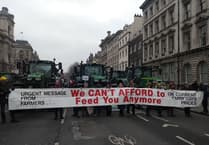She was sitting there quietly when suddenly her phone rang. ‘34’ she said and ended the call. How do you explain that? Was she the member of an international spy ring? Was she telling someone her age? No, we were in a café and my wife was telling our son that we were seated at table 34!
Hopefully this little anecdote is a useful reminder that we need to know ‘the big story’ if we want to understand the significance of any particular detail.
That is why I appreciate the ‘big story’ I find in the Bible. It helps me understand the relationship that should exist between church and state. Starting with the creation of the universe it ends with the glorious vision of a new heaven and a new earth, free of sickness, death and selfish human behaviour. In other words, it tells us that we are living between the resurrection and the second coming of Jesus, and the church exists to serve Him as well as praise Him.
Jesus taught us to pray ‘Your Kingdom come, your will be done on earth as it is in heaven’ but He expects the church to do more than pray. He wants it to be His instrument for good in the world also.
This explains why one prominent Christian leader felt he should write to our new Prime Minister and say: “In every community of the UK, churches are dedicated to tackling poverty, ending loneliness, supporting young people, caring for the elderly and so much more. Churches unite across social divides to see creation cared for, the most vulnerable in our world protected, and refuge given to those in need.”
He also informed him that he was encouraged by the PM’s commitment ‘to ensure strong partnerships with faith communities’ and welcomed his ‘commitment to appoint a government minister to lead on engagement with faith communities’.
But there will clearly be times when the church will feel it should challenge the government too. It’s for this reason that another group of leaders have told him of their concerns about a ban on so-called conversion therapy.
“One of the major presenting issues is the way people talk about a legislative ban on so-called conversion therapy,” the letter reads. “Campaigners often imply that expressing mainstream, traditional Christian beliefs on sexuality or gender identity in pastoral conversations is, inherently, a form of ‘conversion therapy’ they say. They are worried then that this criminalises ordinary Christian practice, raising the alarming prospect of police and prosecutors having to decide whether someone has prayed ‘the wrong kind of prayer’.”
To sum up then, the church should operate as a ‘critical friend’ of those who are in government. It must take time to fully understand the context of the work it is doing and the outcomes that it is working towards. It needs to earn its trust too, so that any criticism is seen as constructive. But above all it has to make sure that everyone knows what God understands by ‘good governance’.
Not everyone will agree with this statement, and they have a God-given right to do so. Christians will differ with each other too. But in the final analysis we are accountable to Him and need to be aware of that in all we say and do, whether we hold political office or not.




Comments
This article has no comments yet. Be the first to leave a comment.